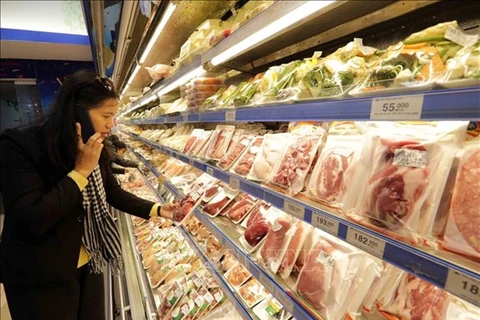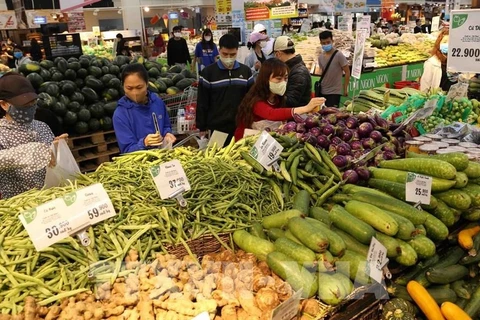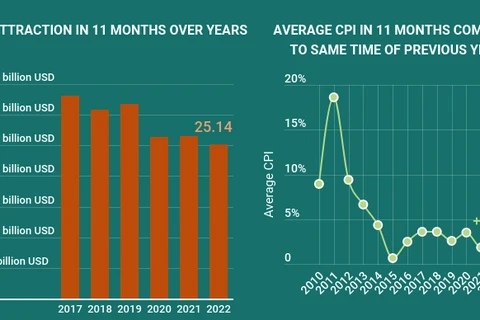HCM City (VNS/VNA) - Following two years of low sales during Tet (the Lunar New Year), things are expected to look up for the fast moving consumer goods industry this time around since the Vietnamese economy has recovered and consumers have a positive outlook on economic prospects, according to market research company Kantar Worldpanel Vietnam.
In its ‘Tet 2023: A cautiously optimistic FMCG outlook’ report, the company says FMCG sales during the 2023 Lunar New Year are expected to grow by 7-9% from last year.
With inflationary pressure continuing, consumers are feeling the squeeze on their wallets and adapting to the situation in various ways.
The occurrence of two major holidays in a single month (New Year and Lunar New Year) is expected to provide a boost to spending.
Tet is the busiest season of the year in Vietnam, usually generating massive demand for shopping, gifting and travel.
In contrast to the 2022 Tet, when demand for celebratory categories fell because of travel and gathering restrictions, this year's massive momentum in beverage consumption will continue to benefit celebratory FMCG categories like carbonated soft drinks and beer.
But rising consumer concerns about income and job security in recent months are expected to throw a spanner in the works.
In the last several months, as a result of the global economic downturn hitting consumption in export markets, factories in Vietnam, especially those making garment and textile and footwear, have seen foreign orders plummet.
Many have had to either allow workers to begin the Tet holidays early or lay off large numbers of them.
Since the middle of this year, 41,500 workers have been sacked, the Vietnam General Confederation of Labour has reported.
Besides, another 430,000 are at risk of having their working hours reduced or otherwise having their employment interrupted.
Many laid-off workers have returned to their rural communities sooner to spend more time with their families, and this implies two things: working-class consumers will be looking for ways to stretch their dong after Tet and there will be a shift in FMCG purchases from urban to rural areas.
The consumer price index edged up in November by 0.39% from the previous month and 4.37% year-on-year, according to the General Statistics Office.
With consumer prices increasing, conversations about the budget will be more prominent and consumers will pay more attention to price tags before buying.
It will also cause people to start planning for Tet shopping earlier.
Some important questions brands need to answer include how sensitive their targeted shoppers are to price changes and how they will react to price changes depending on their financial confidence.
To respond to the specific settings of 2023 such as the migrant shift from urban to rural and early Tet shopping, it is critical that brands set realistic targets and adjust their distribution plans to cater to this shift.
They need to devise the right pricing and promotion strategies while delivering a context-appropriate message for the upcoming Tet./.
In its ‘Tet 2023: A cautiously optimistic FMCG outlook’ report, the company says FMCG sales during the 2023 Lunar New Year are expected to grow by 7-9% from last year.
With inflationary pressure continuing, consumers are feeling the squeeze on their wallets and adapting to the situation in various ways.
The occurrence of two major holidays in a single month (New Year and Lunar New Year) is expected to provide a boost to spending.
Tet is the busiest season of the year in Vietnam, usually generating massive demand for shopping, gifting and travel.
In contrast to the 2022 Tet, when demand for celebratory categories fell because of travel and gathering restrictions, this year's massive momentum in beverage consumption will continue to benefit celebratory FMCG categories like carbonated soft drinks and beer.
But rising consumer concerns about income and job security in recent months are expected to throw a spanner in the works.
In the last several months, as a result of the global economic downturn hitting consumption in export markets, factories in Vietnam, especially those making garment and textile and footwear, have seen foreign orders plummet.
Many have had to either allow workers to begin the Tet holidays early or lay off large numbers of them.
Since the middle of this year, 41,500 workers have been sacked, the Vietnam General Confederation of Labour has reported.
Besides, another 430,000 are at risk of having their working hours reduced or otherwise having their employment interrupted.
Many laid-off workers have returned to their rural communities sooner to spend more time with their families, and this implies two things: working-class consumers will be looking for ways to stretch their dong after Tet and there will be a shift in FMCG purchases from urban to rural areas.
The consumer price index edged up in November by 0.39% from the previous month and 4.37% year-on-year, according to the General Statistics Office.
With consumer prices increasing, conversations about the budget will be more prominent and consumers will pay more attention to price tags before buying.
It will also cause people to start planning for Tet shopping earlier.
Some important questions brands need to answer include how sensitive their targeted shoppers are to price changes and how they will react to price changes depending on their financial confidence.
To respond to the specific settings of 2023 such as the migrant shift from urban to rural and early Tet shopping, it is critical that brands set realistic targets and adjust their distribution plans to cater to this shift.
They need to devise the right pricing and promotion strategies while delivering a context-appropriate message for the upcoming Tet./.
VNA

























